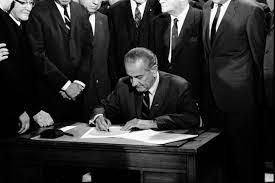JULY 1, 2021 – If ever there were a thoroughly Shakespearean character who occupied center stage of the grand drama of American politics, it was Lyndon Baines Johnson.
I’d never liked the man. When I was a kid, my elders were staunch Republicans, which disqualified him right there, but as I acquired a brain of my own and the Vietnam War dragged on with no end in sight, I developed a strong dislike of the man who was our 36th president. As a 10- to 11-year old living in Minnesota, I had zero appreciation for the Civil Rights movement and knew little about it. Without a TV in our house, I didn’t see fire hoses turned on Blacks demonstrating for the same rights that the rest of us took for granted. I didn’t see or hear Martin Luther King, Jr. speak. The March on Washington didn’t make the Weekly Reader, because the mass demonstration occurred several weeks before school started up in September 1963. By the time the landmark Civil Rights legislation was passed in 1964 (Civil Rights Act) and 1965 (Voting Rights Act), I’m sure I learned about it, but it didn’t make much of an impression.
As the 1960s folded into the historical fog, I remembered Johnson primarily because of Vietnam. If you’d asked me anything else about him, I would’ve mumbled, “became president after the assassination; had something to do with civil rights; pushed for “The Great Society; and attended a teacher’s college back in his home state of Texas before entering politics.”
Then came Caro—Robert Caro—author of the four-volume biography of LBJ; a grand monument of historical scholarship but an incomplete one because it stops short of LBJ’s downfall . . . the Vietnam War (to be covered by a long-awaited volume five).
I remember that while reading every other page of Caro’s magnus opus, I’d think, “LBJ was a wholly corrupt, despicable jerk,” only to turn the page and think, “Well . . . maybe not.”
Yesterday, while reading a page of Taylor Branch’s seminal biography of MLK, I encountered a passage describing an off-the-record meeting at the White House between LBJ and a flock of white Southern Baptists. It was the “good” LBJ . . . all the way.
In his inimitably folksy manner, LBJ schmoozed his visitors into eating out of his hand. “Then abruptly,” writes Branch, Johnson [. . . ] cut through the usual bromides like a brimstone preacher grasping sinners by the throat[. . . He] challenged the South’s leading white ministers to become suffering prophets ‘unafraid of the consequences,’ and warned against ‘voices crying peace, peace, peace, when there is no peace.’ [. . .] ‘Help us pass this civil rights bill . . . Let the acts of everyone, in government and out, let all that we do proclaim that righteousness does exalt the nation.’
For that LBJ deserves much credit, as MLK gave Johnson upon hearing of his “eloquent and passionate plea” to Southern whites. No other politician could have achieved what LBJ set out to do . . . and did.
(Remember to subscribe to this blog and receive notifications of new posts by email.)
© 2021 by Eric Nilsson
